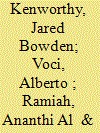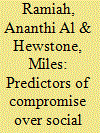|
|
|
Sort Order |
|
|
|
Items / Page
|
|
|
|
|
|
|
| Srl | Item |
| 1 |
ID:
147696


|
|
|
|
|
| Summary/Abstract |
Across one longitudinal and two cross-sectional surveys in Northern Ireland, we tested a model of intergroup relations in which out-group attitudes and behavioral tendencies are predicted by cross-group friendship and positive intergroup appraisals, mediated by intergroup emotions and out-group trust. In study 1, out-group friendship at time 1 predicted out-group trust at time 2 (one year later), controlling for prior out-group trust. In study 2, positive and negative intergroup emotions mediated the effects of friendship on positive and negative behavioral tendencies and attitudes. In study 3, a confirmatory factor analysis indicated that trust and emotions are distinct constructs with unique predictive contributions. We then tested a model in which cross-group friendship predicted intergroup emotions and trust through intimate self-disclosure in out-group friendships. Our findings support an integration of an intergroup emotions framework with research highlighting the importance of cross-group friendship in fostering positive intergroup outcomes.
|
|
|
|
|
|
|
|
|
|
|
|
|
|
|
|
| 2 |
ID:
134935


|
|
|
|
|
| Summary/Abstract |
We assessed whether intergroup contact at a nation-building intervention in Malaysia improved participants’ perceptions of threat and outgroup evaluations and whether this process was conceptually moderated by group status in a three-group setting. We found evidence of a strong relationship between post-intervention contact and post-intervention outgroup evaluations in all groups and evidence of indirect effects of post-intervention contact on outgroup evaluations by symbolic threat for the minority groups rating the majority group. We found that in the context of institutional inequalities, integrated threat theory may not be sufficiently complex to uncover the processes that underlie the contact–attitude link for majority groups rating minority groups. Further, we found indirect effects of post-intervention contact on outgroup evaluations via realistic threat for interminority group ratings. Thus, we elucidate some of the different mechanisms that underlie the intergroup perceptions of majority and minority group members.
|
|
|
|
|
|
|
|
|
|
|
|
|
|
|
|
| 3 |
ID:
114806


|
|
|
|
|
| Publication |
2012.
|
| Summary/Abstract |
This article provides a social psychological analysis of the neglected issue of 'intergroup compromise'. We discuss the factors that promote respondents' willingness to compromise with two very different outgroups. We present a framework in which altruistic motivations (such as empathy) and egoistic motivations (such as trust and symbolic threat) act as proximal predictors of compromise, with intergroup contact as a distal predictor. We found that respondents who had more positive contact with homosexuals perceived them to be less threatening, and felt more empathy towards them, and in turn, were more likely to compromise with them on group-specific issues (controlling for the general tendency to compromise). We also found that respondents who had more negative contact with Muslims perceived them to be more threatening, and in turn, were less likely to compromise with them. We discuss these results with reference to recent developments in intergroup relations and the state of public discourse in contemporary Britain, examine their implications for intergroup relations in pluralistic contexts, and make suggestions for future research on willingness to compromise with outgroups.
|
|
|
|
|
|
|
|
|
|
|
|
|
|
|
|
|
|
|
|
|